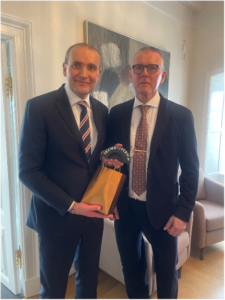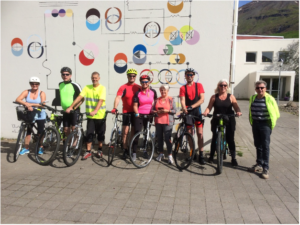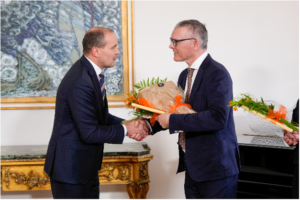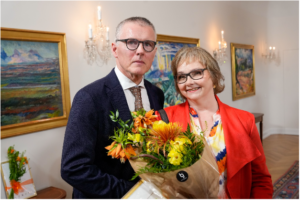An interview with Snorri Már Snorrason on Advocacy from Iceland & FunRide September 26, 2023 by George Ackerman, Ph.D, J.D.

Mr Gudnason, president of Iceland presents Snorri with The Icelandic Public Health Award 2023. The Icelandic Public Health Award is a joint project of the Office of the President of Iceland, the Ministry of Health, the Office of the National Medical Examiner, Mental Health and the Sports and Olympic Association of Iceland.
Introduction
The President of Iceland presented the Icelandic Public Health Award for the first time at a ceremony earlier this year. The award is given in two categories for a significant contribution to the promotion of public health in Iceland. Snorri Már Snorrason won the award in the individual category and was presented by the president.
Snorri Már Snorrason has been fighting Parkinson’s disease for 19 years, and in that fight, exercise is his main weapon. He has been tireless in pointing out the usefulness of any form of exercise, not only as a preventive measure against ill-health, but also as a treatment and in suppressing the symptoms of incurable diseases. His words of challenge, Your Exercise – Your Strength, have become a great encouragement to others in similar situations. The selection committee’s assessment is that Snorri Már is a unique role model, not only for those struggling with Parkinson’s or other diseases, but for everyone who has followed his energy and ambition for years. Snorri Már is living proof of the value of regular exercise despite difficult challenges.
It is a real pleasure to interview Snorri and learn more about his story.
Can you share a little about yourself and when you were diagnosed with Parkinson’s disease?
I’m born in 1964 in a small fishing town in the Westfjords of Iceland, one of five siblings. We enjoyed playing close to the forces of nature, which no doubt both sharpened and hardened us. I’m a family man, my wife and I have a son and a daughter and three grandchildren. I was 40 when I was diagnosed and was in no way prepared for this diagnosis and the problems that came with it. Until then, I had worked both in construction and later in packaging production, where I did technical drawing, structural design and more. I also started my own business in that field but had to succumb to the disease in 2009 when it worsened, though I proceeded working until 2017 at my previous employer.
In 2012 I started my own awareness program named FunRide, or Skemmtiferðin in Icelandic. The Funride is my advocacy. Under the banner of FunRide I for example cycle long distances for several days throughout different parts of the country and inspire locals to join whether they have my disease, other diseases or none. It’s once a summer and has attracted considerable attention. It doesn’t have to be cycling though, it can be lots of other challenging activities.
The purpose of FunRide is not to ask for financial contributions from people and companies, but to ask people to exercise. Of course, FunRide has benefited from grants and other financial support from companies, and I really appreciate that. However, the philosophy is otherwise.
Snorri with his colleagues in one of the many FunRides.

Can you tell me more about your advocacy?
Well, this is my method to educate others about Parkinson’s disease. Since increased exercise has been so successful for me in the fight against Parkinson’s disease, I want to encourage others to exercise as well to maintain good health. The FunRide is not a competitive trip except to overcome your own limitations and at the same time improve your health and increase the quality of life. Everyone is welcome to join in wherever and whenever and ride the distance that everyone wants.
And those who don’t have the opportunity to ride with me can still participate simply by moving more than usual during the FunRide. The participation options are numerous, from targeted training to more everyday things such as parking the car further from the store, taking the stairs instead of using the elevator, going one step further today than yesterday.
The FunRide awareness is one of the biggest motivations I can get for myself. To participate and encourage both me and others, you just must tag posts and photos on Facebook or Instagram with the hashtag #skemmtiferdin.

In turn, Snorri gave the president a jumping rope.
How has Parkinson’s disease affected your daily life?
The effect is everything from thinking nothing of him to admitting that he follows. I just take one day at a time and have reached the point where I wake up with the thought “what am I ready to do today to strike the disease?” It includes exercise, good rest, and nutrition apart from taking the medicines at the right time and stretching all the muscles. On that note, my feeling is that in general patients are perhaps too many recipients of our treatment but need to be much more involved. As a result, I urge patients to also keep a diary or a track about how the disease is developing from time to time.
Can you describe the treatments you have undergone since your diagnosis?
My formal medical treatment is only medication. However, in my mind the treatment is mostly exercise and more exercise. I go every day of the week to gymnastics and stretching classes and spend 2 to 3 hours a day on it. I ride a computerized exercise bike 4 times a week, 25-35 km each time. Apart from that, I make the most of my trips by bike everywhere in the capital area, which by itself can easily be 8-30 km per day. Cycling is by far the most impactful exercise I do. Spinning the pedals over 80 rpm immediately results in pain relief and greater mobility. Furthermore, rope jumping has also helped me a lot. These exercises along with stretching help me manage stress and maintain mental health while living with the disease.
Can you share your strategies that help you cope with your symptoms on a daily basis?
I start every day with floor exercises. I have a mattress on the floor and start every morning with light stretches and some strength exercises, e.g. pushups. I need to wake up my whole body to be ready for the day. Let’s keep in mind all animal species as well as infants stretch when they wake up.
What advice would you give to someone who has recently been diagnosed with Parkinson’s disease?
Though you are diagnosed with Parkinson’s disease, you can still be healthy in a way. In short, my philosophy is: Don’t stop enjoying your health. Always maximize your health status, at whatever stage it may be in – and that costs work. Exercise in any form is beneficial, it has proven to be best to do exercise that requires a lot of strength, stamina, and endurance. Whatever form of exercise you choose, it will have a significant role in managing symptoms and plays a big part in physical therapy. It has helped me handle both physical and emotional challenges and helps me to stay positive and motivated despite the challenges posed by the disease.

Snorri with his wife, Kristrún Helga Björnsdóttir at the ceremony at the President’s Office
In what other ways have you helped Parkinson’s patients in Iceland?
Newly diagnosed people come to me a lot for advice. The reason being that they are more looking for an informal conversation rather than just an interview with a clinical expert.
Usually, it’s relatives or close friends of newly diagnosed people who want me to contact that person, often than not the person is still in denial. My wife and I then invited them home to us for a chat over coffee where all questions are allowed. Newly diagnosed people are surprised by many things, not least the compensation system from the state since the compensation is far from enough to support a person.
Understandably, many people are in denial for years, and I even try multiple times over many years to approach the person in some way. Usually, it has worked out in the end, but in the worst cases it is when the person has deteriorated very much. That’s why I try to establish a connection as soon as possible.
I often say that I don’t teach anyone to have Parkinson’s, but I tell others about how I deal with Parkinson’s. My bad experience can be more helpful to people than the good experience alone.
Through these visits and conversations, I have made great friends and a rich network both domestically and abroad. My aim is to assist them and become mentors to others as well, and so on.
How can someone get in touch? What is your website?
I encourage anyone to drop me a line at snorrimar64@gmail.com. My personal Facebook profile is facebook.com/snorrimar.snorrason and my awareness page is facebook.com/skemmtiferdin.

